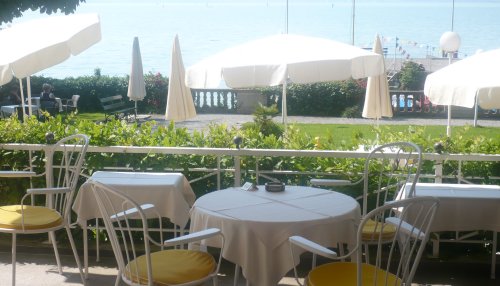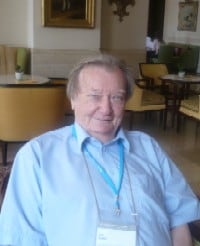
The good life at Bad Schachen
By Matin Durrani in Lindau, Germany
I was tipped off before arriving here in southern Germany for the Lindau Nobel Laureate Meeting – motto “educate, inspire, connect” – that if you’re a member of the press and want to meet any Nobel laureates, you basically have to fix things up in advance, despite the presence of a helpful press office.
Many of the laureates are a law unto themselves and so just turning up and trying to track them down for a quiet half hour with them is not easy – particularly when there are almost 700 students swarming around the “Inselhalle”, where most of the events are taking place.
It was just as well I’d been given that advice because it meant that I was able to spend a decent hour interviewing the Nobel prize-winning Italian particle physicist Carlo Rubbia.
Unlike the students here, he wasn’t cooped up in one of the cheap-and-cheerful hotels or guest houses in Lindau itself, but had been put up – along with all the other laureates – at the suitably grand four-star Hotel Bad Schachen further up along the shores of Lake Constance, where a suite can set you back €389 a night.
Rubbia, who was CERN boss from 1989 to 1993, is now 76 but shows no signs of slowing down. He’s heavily involved in the Gran Sasso National Laboratory in Italy, which recently opened its ICARUS detector that is designed to study neutrinos fired from the CERN lab in Geneva.

Carlo Rubbia
Sitting in the hotel lobby with a glass of mineral water, Rubbia also outlined his passion for the idea of using beams of neutrons to turn long-lived radioactive waste into shorter-lived waste – so-called nuclear transmutation – and potentially even generating electricity in the process. And he has ideas about using thorium as a nuclear fuel as well.
Like most – I’d guess all – Nobel laureates, science has never been just a job for Rubbia, but his hobby and his life. Indeed, he joked that he couldn’t imagine whiling away his hours on the golf course in retirement.
Still, being wined, dined and generally feted by the organizers of the Nobel laureates meeting has got to be one of the benefits of a hugely successful career in science.
And then Rubbia was off to a round-table discussion about particle physics, of which more later. As for me, I’ll have to listen again to my recording of the interview and hopefully fashion it into a coherent article. But not right now, as I’m desperate to get out of the sweltering press tent – Lindau is in the midst of a heatwave – and cool off.



